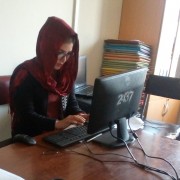Speeches Shim
ACEP ensures that Afghan citizens are well informed about the actions of government officials, and that citizens have the means to influence public policy and advocate for political reform.
CGCS invests in labor-intensive urban clean-up, repair, beautification, and basic solid-waste management activities. CGCS improves the well-being of citizens and urban environmental quality, increases trust between citizens and municipalities, and strengthens government legitimacy. It also provides an economic stimulus to some of the poorest households in partner municipalities.

Gulshan* is from a conservative family in Ghazni province. In 2012, after she finished high school and passed the kankor, or university entrance exam, she decided that she wanted to pursue higher education in Kabul. She hoped to live independently and pursue a career that would allow her to support herself.
USAID’s ALSE research activity examined how well community-based schools helped children to learn core subjects such as literacy and numeracy.
The American University of Afghanistan (AUAF) was chartered under the new Afghan Constitution and Civil Code as a private, independent, non-sectarian institution of higher education.


Comment
Make a general inquiry or suggest an improvement.